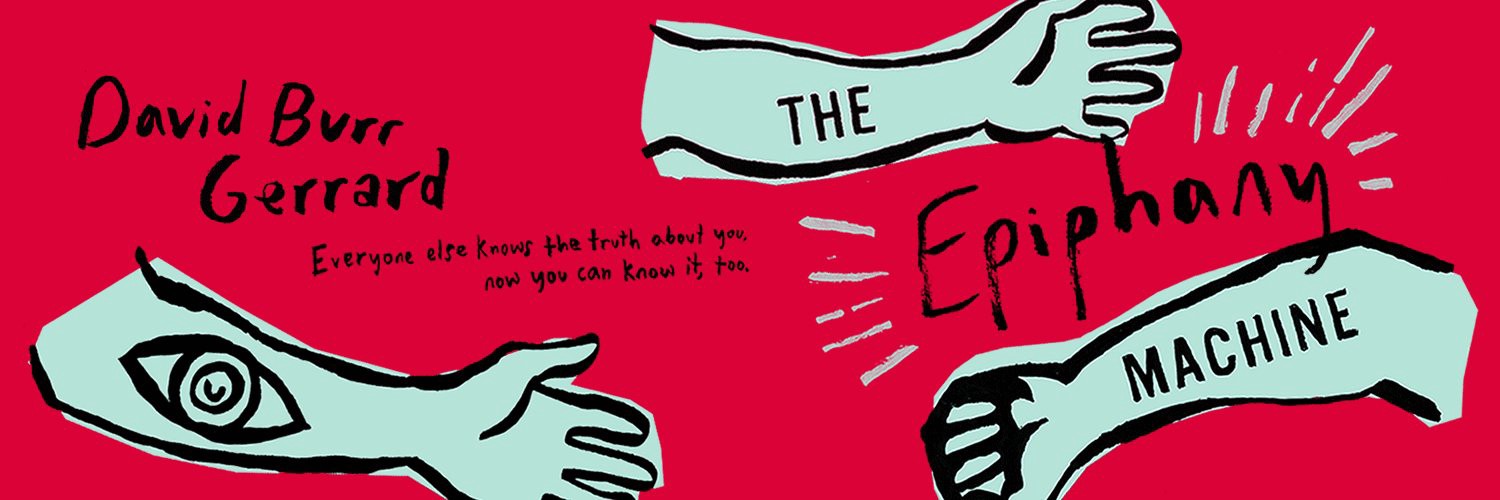One: Reading The Epiphany Machine will not discover anything about you that you do not, in some way, already know.

Those of us who write, usually read voraciously- it’s kind of a trade secret.
Some writers are forced to write because we have read so many books, consumed so many words from the human historical record, writing comes spilling out unbidden, like an overstuffed dictionary leaking letters.
If you’re of the writing persuasion, nothing is immaterial, either. The backs of shampoo bottles, newspaper advertisements, book jackets, opera librettos, tsunami preparedness guides; we read everything.
This of course includes a fair few books. Depending on time, availability, preferred format, attention span, and proximity to toddlers, some writers read upwards of 100 books a year, perhaps more.
Some truly dedicated bookworms read more like 300 books per year. That, along with countless online articles, research forays, and rabbit holes often leaves us middling fair connoisseurs of the written word.
Admitting to reading 300 books a year isn’t about bragging; reading 300 books a year only recently became something to brag about.
Announcing membership in the bookworm pedigree club of 300 books a year, personal pan pizzas not included, is to preface to a book recommendation in the strongest possible terms.
There are a great many perfectly decent to mediocre books in the world, in every genre. The merest glimpse into the writing process of a best-selling novelist like James Patterson, who has a team of writers working under him, bless his mercenary heart, reveals why.
There is nothing new under the sun.
Until there is.
There are detective stories, which run the gamut from cozy mysteries to grisly thrillers, a genre popular with some of the greatest and most prolific writers of the past century- and the not-so-great.
There are science fiction stories, of the epic, fantasy, space opera, futuristic, dystopian, or utopian variety, equally populated by great and terrible writing.
There are romance novels, fiction novels, dramas, coming of age tales, historical novels, horror stories, and great classics of literature.
And then there’s The Epiphany Machine by David Burr Gerrard.
The premise of the story is simple, if unique and simply brilliant:
“Everyone knows the truth about you, now you can too,” promises an ad in the story about the Epiphany Machine.
The Epiphany Machine is a magical tattoo machine that tattoos the truth about a person on their arm. Not just any truth, either: The truth about ourselves that we suspect everyone around us can see, only we can’t.
In the same way so many people we see are oblivious to their own fault lines.
David Burr Gerrard’s Epiphany Machine discovers the innermost truth of the human heart, that which is holding us back, keeping us hostage, poisoning the well; that thing which is our greatest weakness, or greatest strength.
The Epiphany Machine tattoos that truth for all, not least of all the tattooed person, to see.
The epiphanies thus revealed in the story are at times hilarious, at times terrifying and heartbreaking- set against the backdrop of a constant refrain echoing off the walls of a seedy back-room tattoo parlor in New York;
“This isn’t true! It isn’t true! It isn’t true!”
Reading the book is almost as fun as wondering what your tattoo would reveal, and if you would dare use the machine.
Would you, like so many others, misunderstand the fundamental truth? Refuse to believe it? We humans do have a tendency to misunderstand, ignore, or outright forget, many other fundamental truths, no matter how indelible they seem.
The Epiphany Machine is a book that stays with you; you’ll think of it when you look down at the words no one can see on your own arm, or the scarlet letters blazing unseen on the arms of others.
As Medium has strict standards about advertisements, let me assure the faithful readers and editors of Medium: This is not a paid advertisement, merely a rave about an incredible, unforgettable book by a sincere fan.
Who reads a lot.
Check out the authors website. Buy it on Audible. If you haven’t tried audiobooks, consider giving this one in particular a try. Ari Fliakos, who reads the audiobook, gives a stellar performance. Buy it on Amazon, or at Barnes & Noble, or wherever else books are sold.
Get it from the library.
Take it from someone who derives no personal benefit whatsoever from the sales of this book.
But I wouldn’t mind discussing it in the comments.
And not because I’m “dependent on the opinions of others”, or anything.
Am I?
(contributing writer, Brooke Bell)